This article was co-authored by Meera Subash, MD. Dr. Meera Subash is a board certified Rheumatologist and Internist. She specializes in scaling up healthcare technology solutions for rheumatic and chronic disease management. Dr. Subash holds a BA in Human Biology from Stanford University and a Doctor of Medicine (MD) from Texas Tech University Health Sciences Center. She completed a residency in Internal Medicine at The University of California, San Diego, where she served as Chief Resident in Quality and Patient Safety at The VA San Diego Healthcare System. Dr. Subash also completed a fellowship in Rheumatology at The University of California, San Francisco - School of Medicine. She is currently pursuing another fellowship in Clinical Informatics at The University of California, San Francisco - School of Medicine.
There are 8 references cited in this article, which can be found at the bottom of the page.
This article has been viewed 34,788 times.
Knee pain can ruin a good night's sleep, but there are many options for relief. Reduce pain-causing inflammation by using hot or cold therapy to soothe your knee joints, and by taking pressure off your knee. Talk to your doctor about pain treatments, including over-the-counter painkillers and supplements. You can improve the condition of your knees overall by exercising, eating healthy, and treating injuries right away to prevent damage.
Steps
Using Home Remedies
-
1Ice your knee for 20 minutes before bedtime to reduce inflammation. Wrap a flexible gel ice pack in a thin towel and place it around your knee. Make sure that your entire knee is covered for the best results. Hold it there for 15-20 minutes to reduce pain and inflammation. Then, wait about an hour and ice it again. Do this 3-4 times a day until your pain subsides.[1]
- Do not leave the ice pack on for more than 20 minutes, as this can cause damage to your skin and nerves.
- A bag of frozen veggies will also serve as an effective ice pack for your knee.
- In general, ice is more soothing to the area than heat, especially if there's any swelling in the area.[2]
- Alternate warm and cold therapy throughout the day. Try applying a cold compress for 10 minutes, then following it with a warm compress for 10 minutes.
-
2Elevate your knee before bedtime to reduce swelling around the joint. Position a firm pillow under your swollen knee in a way that allows you to lie down comfortably. If you are able to sleep this way, leave the pillow in position all night to help relieve knee pain. If not, elevate your knee for 20 minutes or more right before you go to bed to reduce pain-causing inflammation.[3]
- Elevating your knee throughout the day will also be helpful. If you have an adjustable bed frame, adjust it to elevate both your knees at the same time.
Advertisement -
3Try to sleep with your legs straight to prevent strain on your knee joints. When you go to bed, position yourself so that your legs are extended and your knees are only slightly bent. This will prevent strain on your knees that may worsen your knee pain. To stay in a straight position, try sleeping with a long body pillow to keep your legs in place.
Medicating to Ease the Pain
-
1Consult your doctor about taking an over-the-counter pain medication. Ask your doctor if you should take a non-steroidal anti-inflammatory drug (NSAID) to ease your knee pain at night. NSAIDs relieve pain and reduce inflammation, making them doubly effective at easing joint pain. Alternatively, your doctor may recommend paracetemol, the main alternative for pain relief for those who can't take NSAIDs.[6]
- NSAID drugs include ibuprofen, naproxen, and diclofenac.
- Follow the specific dosage directions, and talk to your doctor about how long you should use NSAIDs. These drugs are intended for short-term use, not for treating chronic knee pain.
- Your doctor may advise against taking NSAIDs if you are pregnant, have had stomach ulcers, have heart, liver, or kidney problems, or are taking other medications that may interact with them.
- NSAIDs may cause indigestion, headaches, dizziness, drowsiness, or allergic reactions.
- If you are already taking NSAID medication and find it ineffective, try switching to one with a slow-release or “12-hour” dose.
-
2Apply a topical analgesic at night as an alternative to oral medications. If you don't wish to take an oral NSAID medication or can't for medical reasons, ask your doctor about topical analgesics containing NSAIDs. These creams, gels, sprays, and patches can be applied directly onto your sore knee at night before you go to bed. The active NSAIDs will soak through the skin to target the painful area directly, potentially providing some relief for discomfort.[7]
- Apply the topical analgesic as directed by your doctor or pharmacist, 2-4 times a day.
- Don't combine oral and topical NSAIDs without your doctor's specific approval.
- Topical analgesics may cause redness, itching, and other skin irritation.
-
3Talk to your doctor about supplements that may relieve joint pain. Ask your doctor if there are any natural supplements that may ease your knee pain. For instance, tumeric, ginger, and omega-3 fatty acids have been shown to reduce inflammation associated with rheumatoid arthritis, osteoarthritis, and arthritis-related conditions. Your doctor will be able to advise you of any possible side effects or interactions with other medications.[8]
- Find more information about supplements on the National Institutes of Health website at https://medlineplus.gov/druginfo/herb_All.html.
Preventing Knee Pain
-
1Treat any knee injury right away to prevent long-term damage. If you experience trauma or blunt force to your knee, see a doctor as soon as possible to assess the damage and receive proper treatment. Depending on the severity of the injury, surgery or physical therapy might be necessary for your knee to heal properly. In the case of more minor injuries, resting your leg and icing your knee in 20-minute intervals several times a day is key to fast healing.[9]
- Follow your doctor's advice for healing time and safe activities while your knee is injured.
- If your knee is locking, giving out, or swelling substantially, see your doctor right away. If it's more of a minor aggravation, you might wait a couple of days to see if it improves on its own.[10]
-
2Do exercises to strengthen the muscles around your knees 2-3 days a week. The best way to relieve knee pain is to strengthen the muscles around them, reducing pressure on your knee joints. Especially focus on exercises that strengthen your quads and gluts, as well as those that stretch your hamstrings.[11] Do 8-12 reps of these exercises about 2-3 times per week to see results. These should include:[12]
- The chair squat, which is essentially a basic squat performed while holding the back of a chair for support.
- Calf raises
- Hip raises, where you lie flat on your back, raise your hips off the ground and then bring them back down slowly.
- Raising a straightened leg while sitting or lying down.
-
3Eat an anti-inflammatory diet to minimize knee pain. Improve your diet by adding fresh produce, fiber, healthy fats, and lean protein as much as possible. These foods will help to reduce inflammation in your body while promoting a weight loss that will prevent strain on your knees. Avoid processed, salty foods and opt for:[13]
- Fish containing omega-3 fatty acids, such as salmon and tuna
- Fiber-rich green vegetables like kale, spinach, and broccoli
- Antioxidant-rich berries like blackberries, strawberries, and blueberries
- Extra virgin olive oil, which contains heart-healthy fat
- Beans such as pinto beans, kidney beans, or garbanzo beans, which are rich in fiber, protein, folic acid, and minerals
Expert Q&A
-
QuestionHow do I relieve knee pain caused by osteoarthritis?
 Meera Subash, MDDr. Meera Subash is a board certified Rheumatologist and Internist. She specializes in scaling up healthcare technology solutions for rheumatic and chronic disease management. Dr. Subash holds a BA in Human Biology from Stanford University and a Doctor of Medicine (MD) from Texas Tech University Health Sciences Center. She completed a residency in Internal Medicine at The University of California, San Diego, where she served as Chief Resident in Quality and Patient Safety at The VA San Diego Healthcare System. Dr. Subash also completed a fellowship in Rheumatology at The University of California, San Francisco - School of Medicine. She is currently pursuing another fellowship in Clinical Informatics at The University of California, San Francisco - School of Medicine.
Meera Subash, MDDr. Meera Subash is a board certified Rheumatologist and Internist. She specializes in scaling up healthcare technology solutions for rheumatic and chronic disease management. Dr. Subash holds a BA in Human Biology from Stanford University and a Doctor of Medicine (MD) from Texas Tech University Health Sciences Center. She completed a residency in Internal Medicine at The University of California, San Diego, where she served as Chief Resident in Quality and Patient Safety at The VA San Diego Healthcare System. Dr. Subash also completed a fellowship in Rheumatology at The University of California, San Francisco - School of Medicine. She is currently pursuing another fellowship in Clinical Informatics at The University of California, San Francisco - School of Medicine.
Board Certified Rheumatologist You should talk to your rheumatologist about medications or therapies that can help. If the underlying cause is osteoarthritis, you could discuss physical therapy, oral medications, or topical medications that may help.
You should talk to your rheumatologist about medications or therapies that can help. If the underlying cause is osteoarthritis, you could discuss physical therapy, oral medications, or topical medications that may help. -
QuestionCan you do knee strengthening exercises every day?
 Meera Subash, MDDr. Meera Subash is a board certified Rheumatologist and Internist. She specializes in scaling up healthcare technology solutions for rheumatic and chronic disease management. Dr. Subash holds a BA in Human Biology from Stanford University and a Doctor of Medicine (MD) from Texas Tech University Health Sciences Center. She completed a residency in Internal Medicine at The University of California, San Diego, where she served as Chief Resident in Quality and Patient Safety at The VA San Diego Healthcare System. Dr. Subash also completed a fellowship in Rheumatology at The University of California, San Francisco - School of Medicine. She is currently pursuing another fellowship in Clinical Informatics at The University of California, San Francisco - School of Medicine.
Meera Subash, MDDr. Meera Subash is a board certified Rheumatologist and Internist. She specializes in scaling up healthcare technology solutions for rheumatic and chronic disease management. Dr. Subash holds a BA in Human Biology from Stanford University and a Doctor of Medicine (MD) from Texas Tech University Health Sciences Center. She completed a residency in Internal Medicine at The University of California, San Diego, where she served as Chief Resident in Quality and Patient Safety at The VA San Diego Healthcare System. Dr. Subash also completed a fellowship in Rheumatology at The University of California, San Francisco - School of Medicine. She is currently pursuing another fellowship in Clinical Informatics at The University of California, San Francisco - School of Medicine.
Board Certified Rheumatologist No, do your strength training workout 2 to 3 times a week. It's important to rest your muscles between workouts.
No, do your strength training workout 2 to 3 times a week. It's important to rest your muscles between workouts. -
QuestionWhen should I go to the doctor for a knee injury?
 Meera Subash, MDDr. Meera Subash is a board certified Rheumatologist and Internist. She specializes in scaling up healthcare technology solutions for rheumatic and chronic disease management. Dr. Subash holds a BA in Human Biology from Stanford University and a Doctor of Medicine (MD) from Texas Tech University Health Sciences Center. She completed a residency in Internal Medicine at The University of California, San Diego, where she served as Chief Resident in Quality and Patient Safety at The VA San Diego Healthcare System. Dr. Subash also completed a fellowship in Rheumatology at The University of California, San Francisco - School of Medicine. She is currently pursuing another fellowship in Clinical Informatics at The University of California, San Francisco - School of Medicine.
Meera Subash, MDDr. Meera Subash is a board certified Rheumatologist and Internist. She specializes in scaling up healthcare technology solutions for rheumatic and chronic disease management. Dr. Subash holds a BA in Human Biology from Stanford University and a Doctor of Medicine (MD) from Texas Tech University Health Sciences Center. She completed a residency in Internal Medicine at The University of California, San Diego, where she served as Chief Resident in Quality and Patient Safety at The VA San Diego Healthcare System. Dr. Subash also completed a fellowship in Rheumatology at The University of California, San Francisco - School of Medicine. She is currently pursuing another fellowship in Clinical Informatics at The University of California, San Francisco - School of Medicine.
Board Certified Rheumatologist You should always go to the doctor if you have substantial swelling, your knee seems to be locking up, or your knee feels like it's unstable or giving out. Keep in mind that treating a knee injury early can prevent long-term damage, so see a doctor if you're worried.
You should always go to the doctor if you have substantial swelling, your knee seems to be locking up, or your knee feels like it's unstable or giving out. Keep in mind that treating a knee injury early can prevent long-term damage, so see a doctor if you're worried.
Warnings
- Though this article provides information pertaining to knee pain, it should not be taken as medical advice. Always consult your physician regarding the best way to treat your specific condition.⧼thumbs_response⧽
References
- ↑ David Schechter, MD. Family Medicine Practitioner. Expert Interview. 15 July 2020.
- ↑ David Schechter, MD. Family Medicine Practitioner. Expert Interview. 15 July 2020.
- ↑ https://health.usnews.com/conditions/pain-management/knee-pain/articles/knee-pain-at-night
- ↑ David Schechter, MD. Family Medicine Practitioner. Expert Interview. 15 July 2020.
- ↑ https://www.prevention.com/health/a20477007/this-is-the-pain-relief-pillow-amazon-users-swear-by-for-better-sleep/
- ↑ https://www.nhs.uk/conditions/nsaids/
- ↑ David Schechter, MD. Family Medicine Practitioner. Expert Interview. 15 July 2020.
- ↑ https://www.arthritis.org/living-with-arthritis/treatments/natural/supplements-herbs/9-supplements-arthritis-12.php?
- ↑ https://www.uofmhealth.org/health-library/tw4354spec
- ↑ David Schechter, MD. Family Medicine Practitioner. Expert Interview. 15 July 2020.
- ↑ David Schechter, MD. Family Medicine Practitioner. Expert Interview. 15 July 2020.
- ↑ https://www.jospt.org/doi/10.2519/jospt.2014.0503
- ↑ https://www.arthritis.org/living-with-arthritis/arthritis-diet/anti-inflammatory/anti-inflammatory-diet.php
About This Article
If your knee pain is keeping you tossing and turning during the night, there are a few ways you can help relieve your pain. Before you go to bed, apply an ice pack or a bag of frozen vegetables wrapped in a towel to your knee for 20 minutes. This will help reduce any inflammation and numb the pain. Alternatively, apply a hot compress for 20 minutes to soothe the joint. While you’re applying ice or heat, keep your knee elevated on a few cushions to help reduce the swelling. You can also sleep with your knee raised if it’s comfortable. If you’re still in pain, try taking over-the-counter painkillers or applying a topical analgesic to your knee. For more tips from our Medical co-author, including how to keep your knees strong and healthy, read on!
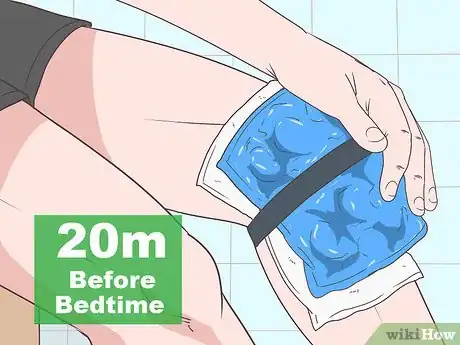

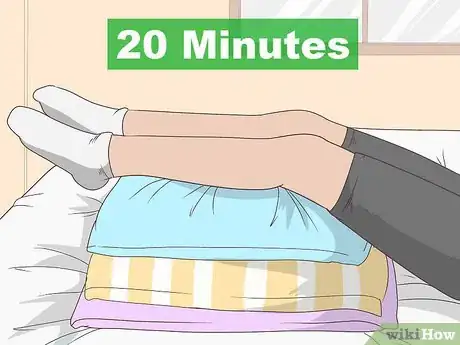
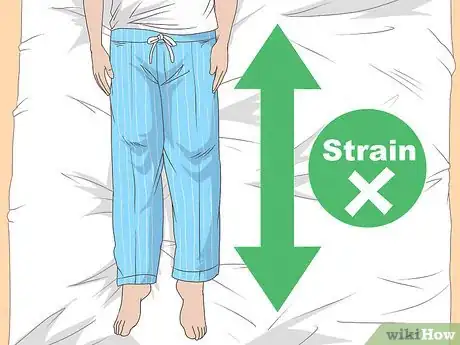
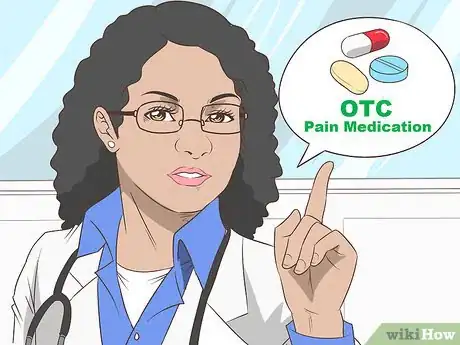
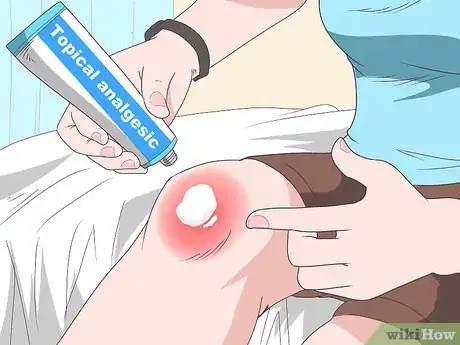


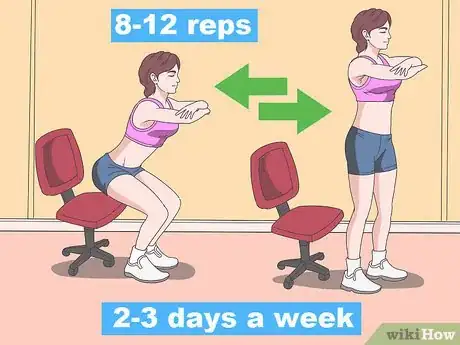
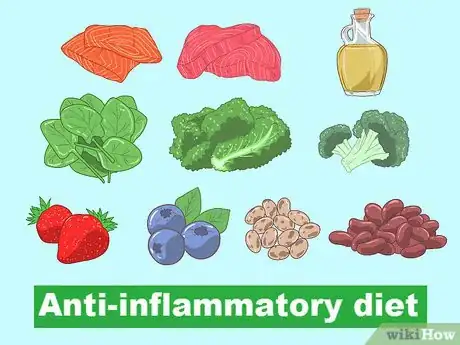
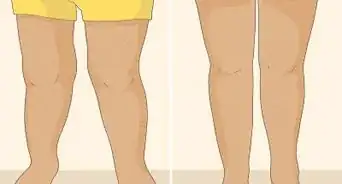
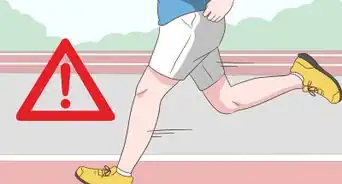
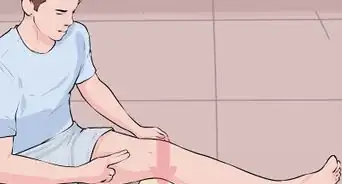


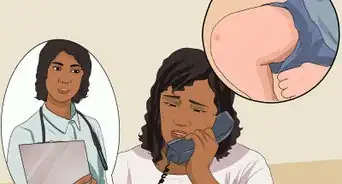
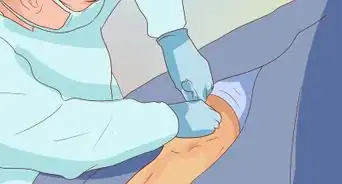
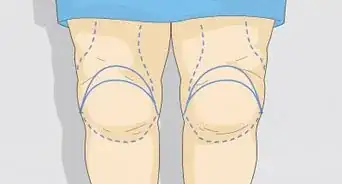

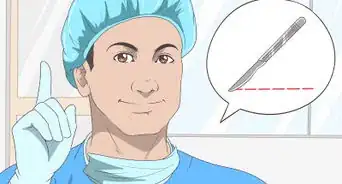

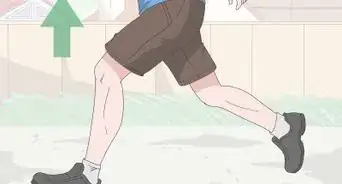
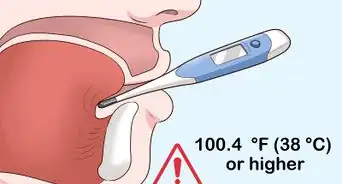







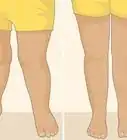






































Medical Disclaimer
The content of this article is not intended to be a substitute for professional medical advice, examination, diagnosis, or treatment. You should always contact your doctor or other qualified healthcare professional before starting, changing, or stopping any kind of health treatment.
Read More...